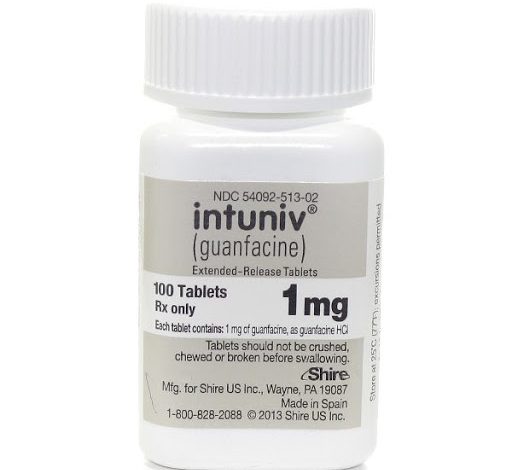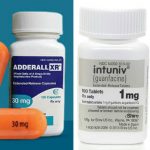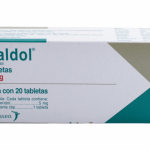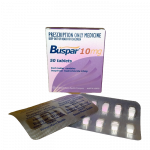Guanfacine (Intuniv): Uses, Dosage, Benefits, How it works, Side Effects

What Is Guanfacine And What Does It Treat?
Guanfacine (Intuniv) is a prescription drug in a class of medications called centrally acting alpha2A-adrenergic receptor agonists that are used to treat attention-deficit hyperactivity disorder (ADHD) in individuals between 6 and 17 years of age. They are used as part of a treatment program to control symptoms of attention deficit hyperactivity disorder (ADHD; more difficulty focusing, controlling actions, and remaining still or quiet than other people who are the same age) in children.
Guanfacine tablets (Tenex) are used alone or in combination with other medications to treat high blood pressure.
Symptoms of ADHD interfere with an individual’s ability to function at school or work or in social settings and include:
• Inattention (e.g., making careless mistakes, losing things necessary for tasks)
• Hyperactivity (e.g., inability to sit still)
• Impulsivity (e.g., interrupting or intruding on others)
A person may have severe inattention without hyperactivity or impulsivity.
Guanfacine (Intuniv) is used in addition to non-medication treatments to manage ADHD symptoms.
What Is The Most Important Information I Should Know About Guanfacine (Intuniv)?
Although some symptoms may improve within days of starting guanfacine, it may take several weeks before you notice the full benefits of the medication.
What Should I Discuss With My Healthcare Provider Before Taking Guanfacine (Intuniv)?
• Symptoms of your condition that bother you the most
• If you have thoughts of suicide or harming yourself
• If you experience side effects from your medications, discuss them with your provider. Some side effects pass with time, but others may require changes in the medication.
• Any other psychiatric or medical problems you have, including heart disease
• All other medications you are currently taking (including over the counter products, herbal and nutritional supplements) and any medication allergies you have
• Other non-medication treatments you are receiving, such as talk therapy or substance abuse treatment. Your provider can explain how these different treatments work with the medication.
• If you are pregnant, plan to become pregnant, or are breast-feeding
• If you drink alcohol or use drugs
How Should I Take Guanfacine (Intuniv)?
Guanfacine (Intuniv) is usually taken one to two times per day. Guanfacine (Intuniv) can be taken with or without food. However, taking it with a high-fat meal can increase absorption and may increase exposure.
The dose usually ranges from 1 mg to 4 mg per day. Only your health care provider can determine the correct dose for you.
Extended-release tablets (Intuniv) should not be crushed, chewed, or divided. Swallow the tablet whole.
What Happens If I Miss A Dose Of Guanfacine (Intuniv)?
If you miss a dose of guanfacine, take it as soon as you remember unless it is closer to the time of your next dose. Discuss this with your healthcare provider. Do not double your next dose or take more than what is prescribed.
What Should I Avoid While Taking Guanfacine (Intuniv)?
Guanfacine (Intuniv) may cause dizziness or drowsiness, especially when first starting the medication. Make sure you know how you react to the medication before you drive, operate machinery, or participate in other activities that may be dangerous if you are not alert.
Avoid drinking alcohol or using illegal drugs while you are taking this medication. They may decrease the benefits (e.g., worsen your condition) and increase adverse effects (e.g., sedation) of the medication.
What Happens If I Overdose With Guanfacine (Intuniv)?
If an overdose occurs, call your doctor or 911. You may need urgent medical care. You may also contact the poison control center at 1-800-222-1222. Overdosing with guanfacine may cause sleepiness, dizziness, low blood pressure, and slow heart rate. A specific treatment to reverse the effects of guanfacine does not exist.
How Long Does It Take For Guanfacine (Intuniv) To Work?
Studies suggest that it can take up to 5 days before you start to feel the benefit of using this medication and four to eight weeks to get the maximum benefit once the right dose is determined. However, improvements in some symptoms may occur sooner.
Can guanfacine (Intuniv) be used to treat anxiety?
This medication has been studied in children and adolescents with anxiety problems and has been shown to help with anxiety, but additional studies are needed. It is currently only FDA-approved to treat ADHD.
Can a pregnant woman take Guanfacine (Intuniv)?
If you are planning on becoming pregnant, notify your healthcare provider so that he/she can best manage your medications. People living with ADHD who wish to become pregnant face important decisions. There are no well-controlled studies of guanfacine use in pregnant women. Animal studies did not demonstrate evidence of fetal harm. It is important to discuss the risks and benefits of treatment with your doctor and caregivers.
Can a breastfeeding woman take Guanfacine (Intuniv)?
Regarding breastfeeding, caution is advised. Due to guanfacine’s low molecular weight, it is likely to penetrate milk at significant levels.
Can adults take guanfacine (Intuniv)?
This medication has only been approved in children and adolescents between the ages of 6 and 17.
What Are The Possible Side Effects Of Guanfacine (Intuniv)?
Guanfacine may cause side effects. Tell your doctor if any of these symptoms are severe or do not go away:
- Constipation
- Decreased appetite
- Decreased sexual ability
- Dry mouth
- Headache
- Irritability
- Nausea
- Stomach pain
- Tiredness
- Vomiting
- Weakness
Some side effects can be serious. If you experience any of the following symptoms, call your doctor immediately:
- Blurred vision
- Fainting
- Rash
- Slow heart rate
Guanfacine may cause other side effects. Call your doctor if you have any unusual problems while taking this medication.
Are There Any Risks For Taking Guanfacine (Intuniv) For Long Periods Of Time?
There are no known problems associated with the long-term use of guanfacine.
What Other Medications May Interact With Guanfacine (Intuniv)?
The following medications may increase the levels and effects of guanfacine:
• Increased levels: ketoconazole (Nizoral®)
• Increased effects:
o Medications that lower blood pressure or cause sedation (sleepiness)
o Other products containing guanfacine or clonidine (Catapres® or Kapvay®)
The following medications may decrease the levels and effects of guanfacine: rifampin (Rifadin®), carbamazepine (Tegretol®), and phenytoin (Dilantin®)
Guanfacine (Intuniv) may increase the levels and effects of valproic acid (Depakene®, Depakote®, Depakote-ER®, Stavzor®).





